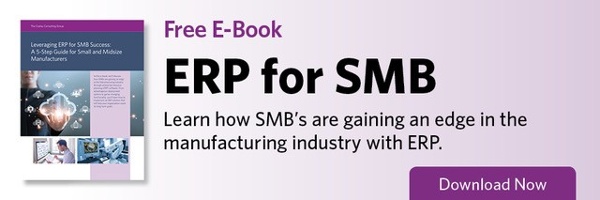How to select an ERP system that will help you safely scale-up in an FDA-regulated industry
Startups in any industry must master the skill of achieving short-term scale-ups without losing sight of their ultimate goal. For life and small and midsize businesses (SMBs) in the sciences startups industry, the long-term target may be FDA approval, sustained profitability or acquisition. Because documented processes and organized recordkeeping help demonstrate the integrity of your operations to auditors and investors alike, an ERP system is a worthwhile asset for any life sciences startup looking to earnestly invest in their growth.
Here are some key considerations when selecting an ERP system for an early-stage life sciences company.
 Compliance
Compliance
As your organization grows and your operations expand, so, too, will your responsibility to maintain regulatory compliance. It’s important that your ERP system is validated to meet the expectations of regulatory bodies; however, don’t stop there.
Examine the functionality of the software and consider how it will support your ability to meet regulations long term. Does it offer e-signature approvals, simple documentation management, full lot and serial tracking and other features that will make it easier to do your job in a compliant fashion? Then, look beyond the product, and consider the ERP vendor. Do they have industry experts on staff who will ensure the software remains in lockstep with shifting regulations? Choose a partner who is committed to anticipating regulatory changes, so you don’t need to worry about gaps in compliance following system adoption.
Capabilities
There are plenty of lightweight ERP solutions on the market today. However, just because a software meets your company’s needs today doesn’t mean it will continue to do so in the years ahead.
Your ERP system requirements list should be a reflection of your long-term business plan. If your goal is to grow your organization to introduce new products or offer additional services, then you need a system with the broad capabilities to support those needs. Increased functionality doesn’t necessarily mean a higher price tag. You can consider a modular ERP system with a lean architecture that allows you to add on features as they become relevant to your business. Or you can minimize the expense of IT infrastructure by hosting your ERP system in a private cloud. Work with your vendor to find a software package that will accommodate growth without busting your budget.
Stability
The development of pharmaceuticals and medical devices can take years, and once a product has been introduced to the market, its supply chain and life cycle must also be managed. You don’t want to adopt an ERP solution only to have it become unsupported a couple of years down the road.
Life sciences SMBs would be wise to work with an established and financially stable ERP vendor. For one thing, you’ll be confident that your software partner has the expertise to shoulder the burden of technical troubleshooting should it be needed. It also means that you minimize the risk of needing a system reboot – and the downtime that comes with it – should your vendor suddenly close up shop.
As a life sciences SMB, your business is inherently risky. You’re balancing regulations, high costs and competitive pressures in a race to market. The ERP system you select can add to or mitigate that risk, so choose wisely.

